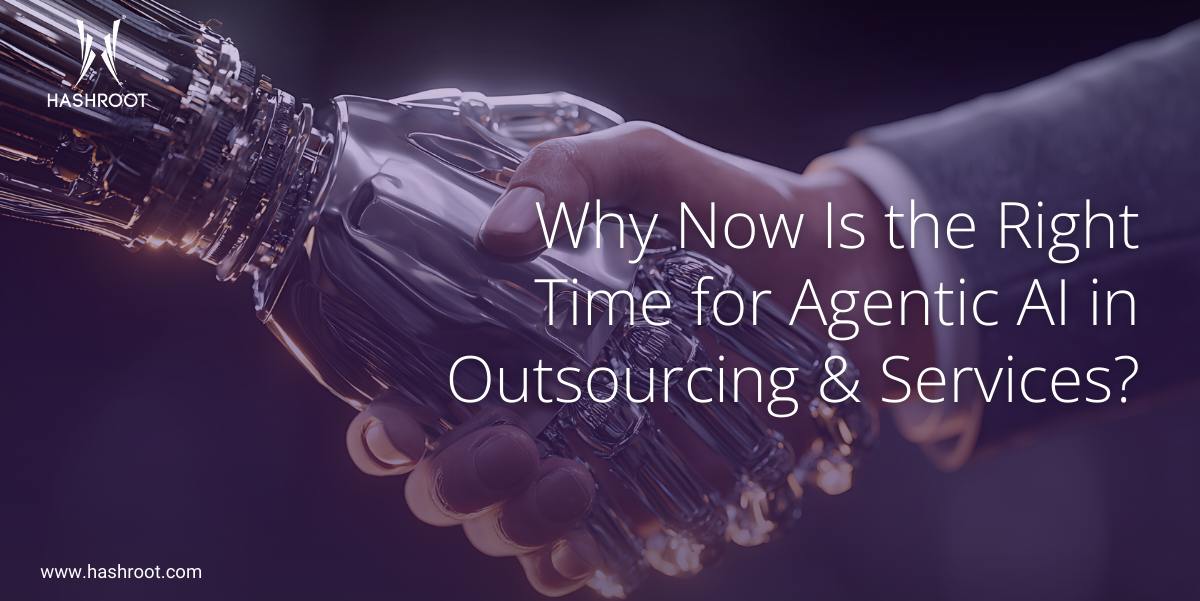Artificial Intelligence has accelerated at a fast pace in the past few years. What started as mere AI co-pilots application tools aimed at facilitating human aid, has now entered the age of agentic AI, when clever systems can fly solo, make choices, and solve problems independently, without incessant human intervention. For managed services, outsourcing, and IT consulting companies, this change is not merely an improvement in tools. It is a basic shift in what technology and business can scale, flex, and provide value.
Why now, though, is the moment to move toward agentic AI? The reason is a mixture of market signals, economic forces, and tech maturity.
Increasing Cost Pressures Are Driving Automation
One of the most powerful indicators comes from the financial aspect of business. Companies in all sectors are being squeezed to lower their costs of operation without lowering their standards of service or even enhancing them. Classic outsourcing and managed services models have depended on labor arbitrage, moving work to places where labor is cheaper. But as the global wage structures continue to shift and inflation climbs, the cost benefit of this model is diminishing.
Agentic AI is a sustainable solution. Through automating tiresome and rule-based tasks—like monitoring systems, reacting to routine tickets, or performing compliance checks, AI agents can efficiently eliminate the necessity of large human teams to perform low-value tasks. Skilled professionals can instead be reallocated to high-impact domains like innovation, customer experience, or problem-solving.
For managed services providers, this doesn't imply only cost reduction; it opens up new models of service delivery wherein first-line tasks can be performed by AI, which allows for quicker turnaround times and improved SLAs.
The Need for Quicker Turnaround Times
Customer expectations also provide another unambiguous indicator. In IT services, cloud management, or business process outsourcing, clients no longer tolerate delays. They demand 24/7 support, instant notifications, and proactive issue fixing.
This is where agentic AI really shines. While traditional monitoring utilities just notify human teams when there is an issue, AI agents have the ability to respond immediately—e.g., restart a service, assign resources, or execute a recovery script without needing human intervention.
This transition from responsive support to self-repairing and proactive operations is becoming a deciding factor in the outsourcing and managed services market. Businesses that incorporate such abilities are able to guarantee faster turnaround, less downtime, and increased customer satisfaction—precisely what today's market is calling for.
Shortage of Skilled Human Talent
Arguably the most urgent dilemma facing businesses and service providers in common is the lack of qualified talent. In areas as diverse as cybersecurity, data handling, or AI engineering, demand outstrips supply by a significant margin. It has become costly and extremely competitive to acquire and retain talent.
Agentic AI does not displace experienced professionals, but it supports them by performing mundane, time-consuming tasks. For instance, AI agents can perform the real-time monitoring of thousands of endpoints, detect anomalies, and only bring forward those issues that actually require human judgment. This takes the load off overworked teams and enables scarce talent to work on strategic projects instead of mundane firefighting.
Effectively, agentic AI then operates as a force multiplier, allowing organizations to accomplish more with the same—or even lesser—resources.
The Technology Has Matured
A few years back, completely autonomous AI operations would have seemed science fiction. Today, with the development of large language models, reinforcement learning, and edge AI, the technology is mature enough for business use. Top cloud vendors and AI research institutions are launching stable platforms that enable enterprises to deploy AI agents with integrated governance, security, and compliance.
Such technological maturity reduces the entry barrier. Businesses no longer have to establish AI capabilities from the ground up; they can utilize pre-established models, APIs, and agent orchestration platforms. For outsourcers and managed services providers, this implies quicker go-to-market and faster ROI.
Why Should Businesses Act Now?
Waiting too long to embrace agentic AI could mean falling behind competitors who are already redefining service delivery with automation. The businesses that integrate AI agents today will:
- Reduce costs and protect margins in a competitive market.
- Deliver faster, round-the-clock turnaround to meet customer expectations.
- Overcome talent shortages by offloading repetitive tasks.
- Build future-proof service models that scale with demand.
Agentic AI isn't about replacing humans, it's about building a brighter partnership between humans and smart systems. Businesses that move now will not only streamline operations but also position themselves as leaders in a saturated market.
The transition from co-pilot AI to autopilot AI is here today. Economic indicators like increasing expense, need for accelerated turnaround, and worldwide shortage of skilled personnel provide the ideal climate for companies to incorporate agentic AI into managed services, outsourcing, and consulting offerings.
Companies that adopt this change will find themselves at the forefront of efficiency, dependability, and innovation. Those that do not act run the risk of lagging behind in an AI-based world.
At HashRoot, we enable organizations to utilize the latest AI capabilities to streamline operations, lower expenditure, and remain competitive. With our combination of AI services, managed offerings, and outsourcing expertise and the potential of agentic AI, we enable organizations to shift from co-pilot to autopilot, fueling smarter, quicker, and more resilient results.

